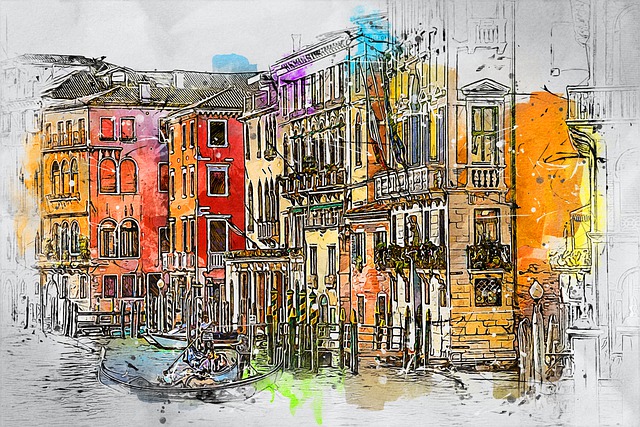
With its sun-drenched olive groves, sparkling waters and vivid bursts of colour, the Italian Riviera has cast its spell on tourists, painters and authors since the 19th century. Lying in the northwestern corner of Italy, the Riviera stretches along the Ligurian sea and has inspired the likes of the painter Monet and the writers Percy Bysshe Shelley and Ernest Hemingway.
Thanks to the sun-baked climate, crystal waters and beautiful villages hugging its coastline, the Italian Riviera has long been the playground of the rich and famous, where you’re as likely to spot a super yacht as a fishing boat.
For those who dream of the Riviera but don’t have the budget of a Kardashian – or the patience for airport queues – here are five books to transport you there instantly. Or, if you’re lucky enough to go there, these books will really come alive in your surroundings.
1. Enchanted April, Elizabeth von Arnim (1922)
Enchanted April may be turning 100 this year, but it remains a timeless classic. Penned by Elizabeth von Arnim in Portofino, it follows four very different women who are fed up with their lives in dreary, grey London and long for a holiday. After responding to an advertisement in The Times, which appeals to “those who appreciate wisteria and sunshine”, they find themselves sharing a small medieval castle on the shores of the Mediterranean for one life-changing month.
When Lottie Wilkins, the novel’s most endearing protagonist, opens her balcony doors to find “all the radiance of April in Italy gathered together at her feet” the reader is right there with her, thanks to von Arnim’s evocative, often sensual descriptions of the castle’s Edenic garden. Among its roses, wild thyme, and honey-scented irises these women find friendship and rediscover love in a novel that brims with kindness, affection and hope.
2. Love and War in the Appenines, Eric Newby (1971)
Eric Newby wrote his love letter to Italy – and to his wife, Wanda – based on diary entries he kept while on the run from advancing German forces after the Italian Armistice of 1943. Having seen only barbed wire and walls for a year as a prisoner of war, Newby is so enchanted by the landscape of the Ligurian hills – the swifts dipping over the water, the cathedrals of trees – that despite the danger, he can’t resist stripping off and jumping into a hidden lake before napping in the hot sun. Newby’s prose will cast a similar spell on the reader as it follows his shelter and protection by an informal network of local Italians, one of whom will become his wife.
3. Extra Virgin: Amongst the Olive Groves of Liguria, Annie Hawes (2001)
After a little bit too much wine and a moonlit tour of an abandoned cottage in the Ligurian hills, Annie Hawes finds herself in possession of a house, two wells and an olive grove – all for just £2000. Her affectionate and often laugh-out-loud account of this relocation is based on the stories she would tell her friends whenever she was forced to return to London to make more money. Blending memoir with travel and food writing, Hawes brings her experience to life with descriptions of “leathery old men on erratic Vespas” and “rusty tin cans full of improbably healthy geraniums”. There is also an endless stream of mouth-watering antipasti – all made with that essential Ligurian ingredient, olive oil.
4. The Land Where Lemons Grow, Helena Attlee (2014)
Attlee remembers the first time she made the journey from England to Italy, 35 years before the publication of The Land Where Lemons Grow. Waking up and realising her train had crossed the border, she looked out of the window to see lemons growing on the platform of the station, somewhere along the Italian Riviera. This youthful trip ignites her passion for those “hot, small suns” which warm the palm and charge the landscape. Written years later her journey from Tuscany to Mount Etna, charting their history, will have you looking at your supermarket lemon with disappointment – and booking a flight.
5. Call Me By Your Name, André Aciman (2007)
Made famous by Luca Guadagnino’s 2017 film of the same name, this novel is a special one. When the handsome research assistant Oliver comes to stay with teenage Elio’s family for the summer the attraction between them is instant and inextricable from the heat and languor of their Ligurian surroundings. Aciman claims that the novel was born when he dreamed of an Italian villa overlooking the sea one April morning; much of his novel feels exactly like this – a poignant, sun-soaked and often heartbreaking fever dream from which it is difficult to wake.
By:
- Hetta Howes Senior Lecturer in Medieval and Early Modern Literature, City, University of London
Disclosure statement
Hetta Howes does not work for, consult, own shares in or receive funding from any company or organisation that would benefit from this article, and has disclosed no relevant affiliations beyond their academic appointment.
This post was originally published at The Conversation.









